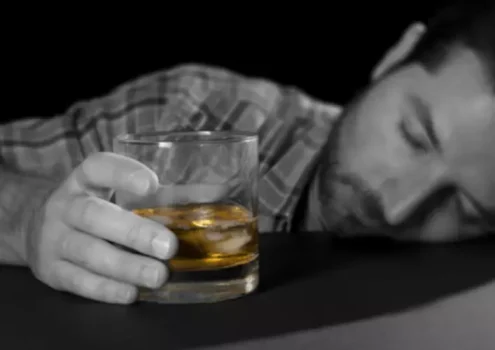
People experiencing mild night sweats from occasional alcohol consumption may find relief using home remedies. A person may not experience any symptoms or signs of liver damage or scarring, which people call cirrhosis, until the liver is badly damaged. Some alcoholic beverages can cause a burning sensation in the throat, especially if a person consumes large amounts or in high concentrations. This section answers some frequently asked questions about a sore throat after drinking. It is also known that alcohol acts on the process of long-term potentiation – the way in which neurons remodel the connections between them after learning. So alterations in both REM and slow wave sleep after drinking may potentially disrupt the brain’s memory processes.

Alcohol addiction symptoms
Alcohol intolerance and alcohol withdrawal can also lead to symptoms such as night sweats and facial redness. However, hot flashes and sweating can also affect other people, since alcohol can affect the endocrine system. This system makes and secretes hormones that can contribute to these symptoms. Hot flushes after drinking alcohol can happen for a variety of reasons, including drinking too much or as a symptom of a hangover. The chemicals in alcoholic beverages can damage the cells in these areas and increase the likelihood of cancerous growth. There are various reasons why a person may develop a sore throat after drinking.

our Brain Doesn’t Function As Well
The fact that ethanol is created from sugars is also likely to increase our propensity to drink. For example, research suggests that some individuals have a predisposition to prefer sugar and this can drug addiction make them more prone to developing alcohol addiction. Alcohol also seems to act on some of the same brain areas activated by sweet tastes. You can reduce the intensity of alcohol flush by moderating your alcohol intake, opting for beverages with lower alcohol content, and staying adequately hydrated while consuming alcohol. Drinking alcohol in a hot environment can exacerbate feelings of heat, as the body’s natural cooling mechanisms may be less effective in such conditions. The sweating can be intense and is often accompanied by other withdrawal symptoms such as shaking rapid heartbeat, and severe anxiety.

Social Drinking vs Problem Drinking Health Encyclopedia University of Rochester Medical Center
- If you’re seeking help for yourself or a loved one, our expert team is here to guide you every step of the way.
- Recovery from alcohol addiction is a long-term process that doesn’t end after detox or a stay in a residential treatment facility.
- According to him, there are multiple reasons that can lead to this problem, and the amount of alcohol also has a major role to play.
- Due to the hangover inducing a fight-or-flight response, hot flashes may occur while you are drunk and feeling hungover.
- Some people suffer from Asian flush reaction – and are incapable of properly metabolizing alcohol.
- It should not be used in place of the advice of your physician or other qualified healthcare providers.
Similar to hangover symptoms, hot flashes and sweating occur because alcohol withdrawal triggers our body’s fight-or-flight response. Typically, alcohol depresses our central nervous system, making our brain highly sensitive to glutamate — a neurotransmitter that excites our brain. However, without alcohol in our system, our brain becomes easily overexcited, leading to increased blood pressure and heat. Like hangover symptoms, hot flashes and sweating from AWS can also occur because alcohol withdrawal triggers your body’s fight-or-flight response.

Alcohol may cause hot flashes while you drink and after you’ve stopped drinking.
With around 2 years of experience in the wellness industry, she is connected to leading experts and doctors to provide our readers with factually correct information.
- REM sleep is important for cognitive processes such as memory consolidation so reducing the time in which this process occurs has a detrimental effect on memory.
- This combined with much more heat being produced by your liver really makes you heat up in the night.
- Although alcohol has a depressing impact on the central nervous system, during withdrawal the brain may struggle to adjust to the declining sedative impact of alcohol.
- If you or someone you love is dealing with drinking or substance use that has gotten out of hand, there are confidential treatment options available.
If you turn red when drinking alcohol while others stay cool, you may have this intolerance. Keep =https://ecosoberhouse.com/ reading for our favourite tips on how to manage and prevent alcohol flushing. In conclusion, the sensation of feeling hot after consuming alcohol, commonly known as alcohol flush, is primarily a result of alcohol’s vasodilatory effects. This reaction can be uncomfortable and embarrassing for some individuals, but it is generally harmless. Understanding the reasons behind alcohol flush and taking necessary precautions can help you have a more enjoyable drinking experience.

Both hot flashes and sweating are signs that your hangoverhas triggeredyour sympathetic nervous system, commonly referred to as your fight-or-flight response. It’s also useful to note that while you may begin feeling warm when drinking alcohol, this is actually deceiving. In addition, sweating caused by alcohol lowers your body temperature even further. However, as mentioned above, one should be careful when drinking in cold weather. The feeling of warmth may actually mask a drop in body temperature, and sweating makes you more likely to catch a chill.
Sweating and hot flashes are signs of the body’s fight-or-flight response. Alcohol acts does alcohol make you sweat as a vasodilator, widening blood vessels and increasing blood flow to the skin’s surface, leading to a sensation of warmth. If you want to cut back on drinking, but don’t know where or how to start, consider trying Reframe. We’re a science-backed app that has helped millions of people reduce their alcohol consumption and enhance their physical, mental, and emotional well-being.
- If you only have one drink in an hour, your body can break down that alcohol amount easily enough.
- In some cases, you may even experience excessive sweating or hot flashes.
- Those with a gene called ALDH2 break down acetaldehyde slowly, allowing it to flood their system.
- It’s a common myth that alcohol raises your internal body temperature, but studies show it can actually lower it.
Is It Normal to Have Hot Flashes After Drinking Alcohol?
Other physical symptoms such as a rapid heart rate, dizziness, and sometimes nausea can also occur. Alcohol can produce an uncomfortable flushing reaction in some people, as well as other symptoms. But, when you’ve been drinking, your liver is madly metabolising all the alcohol, breaking it down to get it out of your blood stream. This is a really exothermic process which means it produces a lot of heat. Rough sleeping in extremely low temperatures over winter, combined with prevalent alcohol addiction problems, make the homeless population particularly vulnerable to hypothermia. For example, this trait is more common in those with East Asian descent, due to a genetically determined deficiency of an enzyme which helps the liver break down alcohol.
Why Does Alcohol Cause Hot Sweats?
Usually it’s fine but it can be quite dangerous for people who live on the street and if they drink they might not notice it’s really cold so it can be quite dangerous for them. For most of us the chances of developing hypothermia are slim as long as we drink sensibly and avoid alcohol-induced bad decisions like going out in freezing weather. Hard seltzer is the popular summer beverage that’s taken the US and now Britain by storm. We burst the bubble on many of the health myths surrounding this fizzy alcoholic drink.

